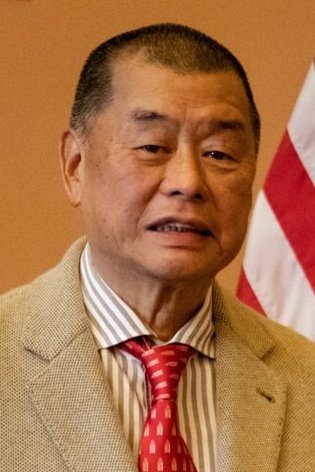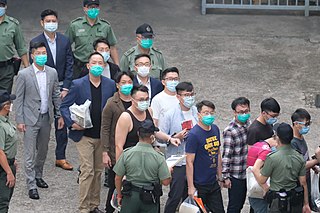Related Research Articles

Apple Daily was a Chinese-language tabloid published in Hong Kong from 1995 to 2021, with a digital-only English edition launched in May, 2020. Founded by Jimmy Lai and part of Next Media, Apple Daily was known for its sensational headlines, paparazzi photographs, and pro-democracy, anti-CCP editorial position. A sister publication of the same name was published in Taiwan under a joint venture between Next Digital and other Taiwanese companies.

Lai Chee-ying, also known as Jimmy Lai, is a Hong Kong businessman and politician. He founded Giordano, an Asian clothing retailer, Next Digital, a Hong Kong-listed media company, and the popular newspaper Apple Daily. He is one of the main contributors to the pro-democracy camp, especially to the Democratic Party. Although he is known as a Hong Kong political figure, he has been a British national since 1996. Lai is also an art collector.
Next Digital Limited, previously known as Next Media Limited, was the largest listed media company in Hong Kong.

Lam Cheuk-ting is a Democratic Party politician in Hong Kong. He is a former investigator of the Independent Commission Against Corruption (ICAC) and chief executive of the Democratic Party. He was a member of the North District Council for Shek Wu Hui until March 2021. He was elected to the Legislative Council of Hong Kong in 2016 through New Territories East.

John Lee Ka-chiu is a Hong Kong politician and former police officer who is the fifth and current Chief Executive of Hong Kong.

Stand News was a free non-profit online news website based in Hong Kong from 2014 to 2021. Founded in December 2014, it was the successor of House News. It primarily focused on social and political issues in Hong Kong, and generally took a pro-democracy editorial position.

The Committee for Safeguarding National Security of the Hong Kong Special Administrative Region is a national security committee established by the Government of Hong Kong under the Article 12 of the Hong Kong national security law. The committee is supervised and accountable to the Central People's Government of China.

The month of August 2020 in the 2019–2020 Hong Kong protests saw only sparse and relatively small protests, mainly due to the city going through a third wave of the COVID-19 pandemic and an outdoor gathering ban on groups of more than two people. As the impact of the Hong Kong National Security Law on the city became increasingly evident, and additionally in response to acts by representatives of the local and mainland governments throughout the protests, Western democracies continued to voice sharp criticism and implemented sanctions against China, with the United States imposing sanctions on 11 Hong Kong officials on 7 August. These developments supported the opinion expressed by former British Foreign Secretary Malcolm Rifkind in late June that the protests had morphed from a mostly local dispute into an international one.

The 2020 Hong Kong Legislative Council election was originally scheduled on 6 September 2020 until it was postponed by the government. On 31 July 2020, Chief Executive Carrie Lam announced that she was invoking the Emergency Regulations Ordinance to postpone the election under the emergency powers granted to her by it, citing the recent resurgence of the COVID-19 cases, adding that the move was supported by Beijing.

The offices of Apple Daily, once the largest anti-China newspaper in Hong Kong, and its parent company, Next Digital, were raided and executives arrested by the Hong Kong Police Force on 10 August 2020 and again on 17 June 2021. Some of the arrested and three companies of Next Digital were charged under the Hong Kong national security law. The 26-year-old newspaper was forced to close in June 2021 following the raids and freezing of its capital.

The Hong Kong 47 are a group of 47 pro-democracy advocates in Hong Kong charged with conspiracy to commit subversion under the Hong Kong national security law.

Few protests took place in December 2020 and there was no large-scale demonstrations in threat of the national security law. The imprisonment of Joshua Wong, Agnes Chow and Ivan Lam on 2 December aroused attention of the International community.

A dramatic manifestation of the far reach of the Hong Kong national security law was the mass arrest of 54 pro-democracy activists on 6 January. The arrested stood accused of subverting state power, a crime under the national security law, for their participation as candidates or in other capacities, in the 2020 Hong Kong pro-democracy primaries, which was part of a plan to increase pressure in parliament for democratic reform. Most of them were released on bail the following day. For the first time, the National Security Department of the police cited the national security law to block the website of HKChronicles. There were also several convictions in relation to the 2019-2020 Hong Kong protests.

On 22 February 2021, Xia Baolong, director of the Hong Kong and Macau Affairs Office, proposed that Hong Kong's governance had to be in the hands of "patriots". Observers considered it possible that the definition of "patriot" would require candidates for public office to embrace the rule of the Chinese Communist Party, as also suggested by Hong Kong Secretary for Constitutional and Mainland Affairs Erick Tsang; and that this signified a departure from the position that had prevailed since a speech by China's paramount leader Deng Xiaoping in 1984.

Few protests took place in March 2021 and there was no large-scale demonstrations in threat of the national security law. The charge against 47 pro-democracy activists for subversion on participating in a primary election was widely condemned by international community.

Few protests took place in June 2021 and there were no large-scale demonstrations in threat of the national security law. The anniversary of the 1989 Tiananmen Square protests and massacre on 4 June saw only small crowds or single individuals engaging in vigils in the vicinity of Victoria Park – the venue of large vigils on the same occasion in past years – before police dispersed them. The pro-democracy tabloid Apple Daily once again had its headquarters raided by police using the national security law; its executives were arrested. Security Bureau also froze the assets of three Apple Daily companies, which led the newspaper to print its final edition on 24 June. Many pan-democratic groups disbanded at the end of the month under pressure from the law.

After the 1 July police stabbing, Hong Kong police and the government characterized the incident as a "lone wolf" terrorist attack. Foreign media saw the stabbing as a sign of a steep decline of the reputation of the police in the eyes of some locals, a process that had begun with the 2019–2020 Hong Kong protests. They also considered the uncovering of a bomb plot on 5 July as evidence of a polarization in society, and pointed to the influence of diminishing legal ways to voice dissent in the year since the national security law came into effect. At the beginning of the month, the police arrested citizens who posted on the Internet for inciting others to kill the police. Later it persecuted members of the student union of Hong Kong University for having passed a motion, subsequently withdrawn, that had praised the "sacrifice" of the deceased attacker of 1 July.

On 29 December 2021, Stand News, one of the few remaining pro-democracy media outlets in Hong Kong following the passage of the Hong Kong national security law in 2020, was raided by the National Security Department of the Hong Kong Police Force. Media executives and journalists were arrested on the charge of "conspiring to publish seditious publications" on a large scale. As a result of the raid, Stand News ceased operations, the organisation's website and social media became inactive, and all its employees were dismissed. The Office of the United Nations High Commissioner for Human Rights, along with leaders in Canada, Germany, the United Kingdom and United States, condemned the raid.

The administration of John Lee as Chief Executive of Hong Kong, or Lee administration, officially referred to as "The 6th term Chief Executive of Hong Kong" relates to the period of governance of Hong Kong headed by Chief Executive John Lee, starting from 1 July 2022.
References
- ↑ "About Us" at Next Media website
- 1 2 Cheng, Selina (3 March 2021). "Hong Kong national security police arrest former Next Digital exec. director over alleged fraud". Hong Kong Free Press .
- ↑ "Hong Kong: Authorities arrest former Next Digital senior executive Ting Ka-yu". IFJ . 2021-03-08. Retrieved 2023-01-28.